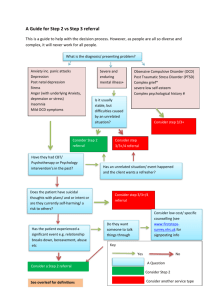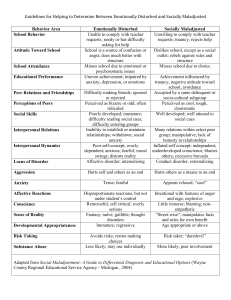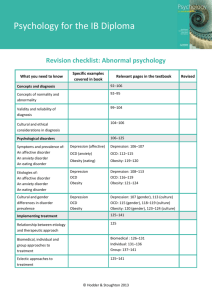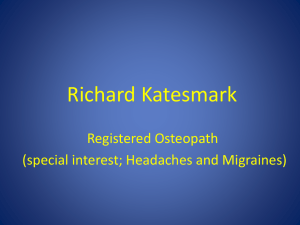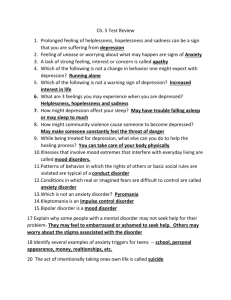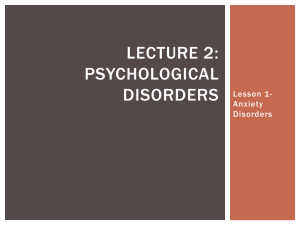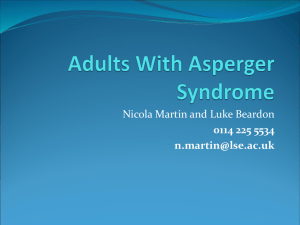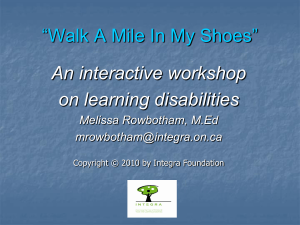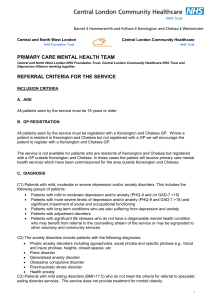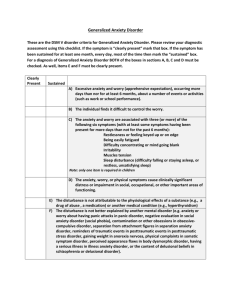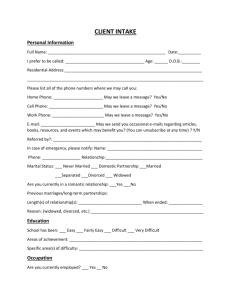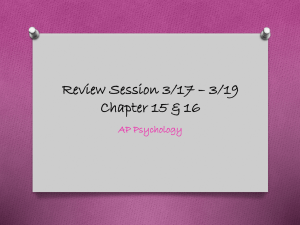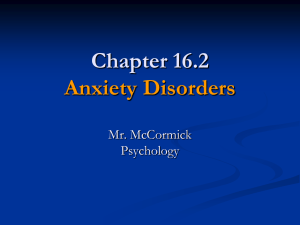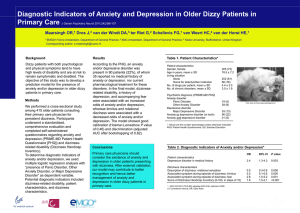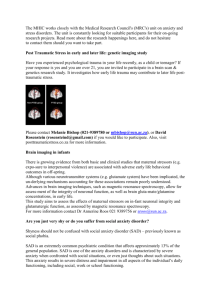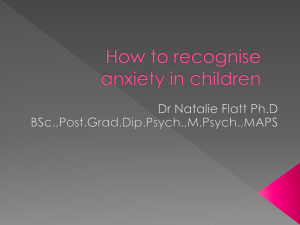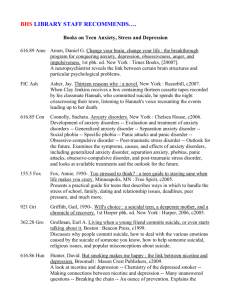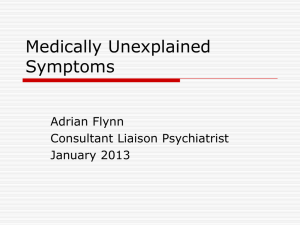Study Skills & Mental Health
advertisement
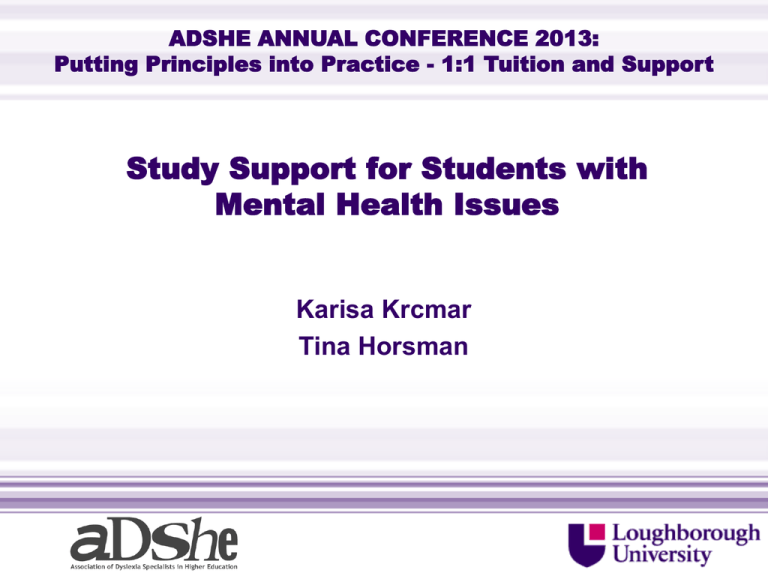
ADSHE ANNUAL CONFERENCE 2013: Putting Principles into Practice - 1:1 Tuition and Support Study Support for Students with Mental Health Issues Karisa Krcmar Tina Horsman Aims for today Understand key elements of major, DSA recognised, mental health conditions. Explore strategies suitable for students with mental health issues through case studies. Packs PowerPoint slides Mental Health Recovery Star (Mental Health Providers Forum) Mental Health Recover Ladder of Change (Mental Health Providers Forum) Study Star (adapted from Mental Health Providers Forum) Example of crisis response pathway Some helpful websites Post-it Notes for questions What is good mental health? make the most of the opportunities play a full part amongst our family workplace, community and friends linked with our physical health key to living a fulfilling life Physical and mental health … Underpins learning (motivation, interest, concentration, enthusiasm) Can help/hinder how someone goes about their learning (anxiety, depression, stress) Daily emotions help someone decide whether they are having a good overall ‘student experience’ Social exclusion – the big issues Disrupts life Pushed out of society Ceases to participate Social exclusion Lose hope for the future Lose sight of potential Discrimination and stigma Risky business Mental Health Is the most common type of disability amongst young people aged 18-30 years. (e.g. Loughborough University) 500-600 students. Comes under Equality Act 2010. Terminology Neurosis: mental disorder with an organic basis Psychosis: more severe internal basis We have access to: Mental health support team - anybody else have this? Information will be in Needs Assessment - student will have copy and you can ask them - but it’s not always available. http://www.ntw.nhs.uk/pic/selfhelp/ Mental Health concerns considered today OCD Eating disorder Anxiety & stress Post traumatic stress disorder (PTSD) Depression Bi-polar disorder Schizophrenia Recovery Star & Ladder of Change Models from Mental Health Providers Forum (cc) Study Ladder of Change Self-Reliance Learning Believing Stuck Accepting Help Case Studies Adam - OCD, anxiety, stress, eating disorder Faith - Asylum Seeker, PTSD, Depression Sophie - Bi-polar disorder Imran - Schizophrenic Adam OCD, anxiety, stress, eating disorder Undergraduate in geography. 1st year at different university, came into 2nd year at new university. No EP available. No Needs Assessment available. Adam OCD Disordered Eating Anxiety On edge; pessimistic; negative Stress Fear of failure (constant; unable to make decisions; difficulty concentrating; avoids difficult situations; denies or overthinks a problem Feeling high; poor concentration; feeling tired and weak; focussed on food (essays) How does Adam present? Attitude nervous anxious takes time to settle Learning has to follow routine memory concentration Behaviour rituals passive everything is a problem Knowledge knows small amount about lots of subjects cannot always make links between cause and effect Links to study support: - concentration – reading, writing, revision, exams Strategies Reading to locate information Selecting if relevant Writing Success Faith Post traumatic stress disorder & depression Undergraduate in Social Psychology. 1st year at different university. Doctor’s letter (confidential, no access unless student wishes to share). Needs Assessment recommends study support for research, anxiety, work management, organisation. Faith An asylum seeker from Somalia PTSD Feeling detached; disturbed sleep; easily startled; avoids situations that reminds them of trauma; intrusive thoughts/images; OCD-type behaviour; feelings of guilt Depression Memory; procrastination; selfblame/guilt; negative; bleak future; tired; difficulty sleeping; moves slowly How does Faith present? Attitude timid, disinterested, changeable, anxious Learning styles vary, memory, Ideas, Inconsistent, concentration Behaviour disorganised, bad timekeeping, passive, inconsistent Knowledge vocabulary (2nd language), conceptual, contextual (educational background) Links to study support: - procrastination, time management, self esteem, confidence, concentration, stress & anxiety Study Support Activities Sorted - the daily organiser http://www.youtube.com/watch?v=HOuHRn_D_CM Sophie Bi-polar Undergraduate in Textiles: Innovation and Design 2nd year Came with assessment Needs assessment shows 1:1 for memory issues and organisation Sophie Bi-polar Highs Talks fast Racing thoughts Lack of concentration Poor judgement Impulsive Self-centred Extreme irritability Lows Chronic fatigue Sense of worthlessness Guilt Lack of concentration Poor memory Loss of interest How does she present? Attitude keen for help changeable anxious Behaviour disorganised jumps in bad timekeeping Learning: poor memory rushes through surface learner Knowledge: good some contextual things missing Links to study support: - concentration, impulsivity, memory, self-esteem, motivation Organisation http://www.6wunderkinder.com/wunderlist Simple to do list, can create several lists, can add sub-lists and extra notes https://evernote.com/ Saves your ideas, video, audio I can finish a task Imran Schizophrenia Undergraduate in Mechanical Engineering. 2nd year. Doctor’s letter (confidential, no access unless student is willing to share). No Needs Assessment available. 1st year was OK - didn’t come for support, now referred from Mental Health Support Team. Imran Schizophrenia Delusions Concentration Expression Lack of interest Avoidance Thought disorder Over reliance on tutor How does Imran present? Attitude: interested, outgoing, pleasant Learning: poor memory, difficulty concentrating Behaviour: reasonably organised, anxious, slow reading/working, can sometimes lose motivation Knowledge: good, some contextual things missing Links to study support: - organisation, stress management, memory Illness Relapse Anxiety This way with study support Recovery Stress Tiredness & lack of motivation Depression Panic Excessive anxiety Introverted and introspective (a world of your own) Staring without blinking http://www.youtube.com/watch?v=mQ9OWMsJBTk http://www.youtube.com/watch?v=d-_q-md80VQ Strategies Keep stress and anxiety low - exams / revision /strategies to avoid impulsivity revision schedule small, manageable chunks exam time break down question draw out time keeping in exam liaise with MHT on relaxation strategies. awareness of own feelings - anxiety levels rising. 2nd floor 1st floor Monday Morning Afternoon Evening Tuesday Wednesday Thursday Friday Saturday Sunday Implications for Study Support Is this familiar? Perhaps we know more than we thought. We do have tools already. How do we, as tutors, respond? Attitude … Behaviour … frustration irritation Learning … Knowledge … inadequate recognise the need to acquire it Crisis response plan Ensure you know the procedure of the organisation for crisis response. Emergency phone number? Support staff? Health centre? What’s your responsibility? SAMARITANS 08457 90 90 90 Tutors SpLD Mental Health Conclusion Many areas cross over. Where we talk of co-occurrence of SpLDs there is co-occurrence of characteristics with mental health issues. They may not be SpLD students but we can use our toolbox. We have to recognise their learning characteristics. We should have the confidence to support.
